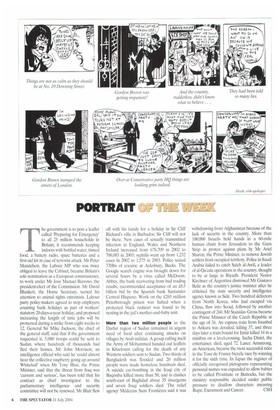T he government is to post a leaflet called Preparing for
Emergency' to all 25 million households in Britain; it recommends keeping indoors with bottled water, tinned food, a battery radio, spare batteries and a first-aid kit in case of terrorist attack. Mr Peter Mandelson, the Labour MP who was twice obliged to leave the Cabinet, became Britain's sole nomination as a European commissioner, to work under Mr Jose Manuel Barroso, the president-elect of the Commission. Mr David Blunkett, the Home Secretary. turned his attention to animal rights extremists. Labour party policy-makers agreed to stop employers counting bank holidays as part of workers' statutory 20-days-a-year holiday, and proposed increasing the length of time jobs will be protected during a strike from eight weeks to 12. General Sir Mike Jackson, the chief of the general staff, said that if the government requested it, 5,000 troops could be sent to Sudan. where hundreds of thousands had fled their homes. Mr John Morrison, an intelligence official who said he 'could almost hear the collective raspberry going up around Whitehall' when Mr Tony Blair, the Prime Minister, said that the threat from Iraq was 'current and serious', has been told that his contract as chief investigator to the parliamentary intelligence and security committee will not be renewed. Mr Blair flew
off with his family for a holiday in Sir Cliff Richard's villa in Barbados; Sir Cliff will not be there. New cases of sexually transmitted infection in England, Wales and Northern Ireland increased from 678,709 in 2002 to 708,083 in 2003; syphilis went up from 1,232 cases in 2002 to 1,575 in 2003. Police seized 3701bs of cocaine at Aylesbury, Bucks. The Google search engine was brought down for several hours by a virus called MyDoom. Abbey, the bank recovering from bad trading results, recommended acceptance of an £8.5 billion bid by the Spanish bank Santander Central Hispano. Work on the £265 million Peterborough prison was halted when a protected black redstart was found to be nesting in the jail's mother-and-baby unit.
More than two million people in the Darfur region of Sudan remained in urgent need of food after continuing attacks on villages by Arab militias. A group calling itself the Army of Mohammed handed out leaflets in Khartoum calling for the death of any Western soldiers sent to Sudan. Two thirds of Bangladesh was flooded and 20 million people were made homeless; hundreds died. A suicide car-bombing in the Iraqi city of Baqouba killed more than 50, and in clashes south-east of Baghdad about 35 insurgents and seven Iraqi soldiers died. The relief agency Medecins Sans Frontieres said it was
withdrawing from Afghanistan because of the lack of security in the country. More than 100,000 Israelis held hands in a 60-mile human chain from Jerusalem to the Gaza Strip in protest against plans by Mr Ariel Sharon, the Prime Minister, to remove Jewish settlers from occupied territory. Police in Saudi Arabia failed to catch Saleh al-Awfi, a leader of al-Qa'eda operations in the country, thought to be at large in Riyadh. President Nestor Kirchner of Argentina dismissed Mr Gustavo Beliz as the country's justice minister after he criticised the state security and intelligence agency known as Side. Two hundred defectors from North Korea, who had escaped via China, flew into Seoul, followed by another contingent of 260. Mr Stanislav Gross became the Prime Minister of the Czech Republic at the age of 34. An express train from Istanbul to Ankara was derailed, killing 37, and three days later a train bound for Izmir killed 14 in a minibus on a level-crossing. Sacha Distel, the entertainer, died, aged 72. Lance Armstrong, an American, became the most successful rider in the Tour de France bicycle race by winning it for the sixth time. In Japan the register of officially recognised pictograms representing personal names was expanded to allow babies to be called Prostitute or Buttocks, but the ministry responsible decided under public pressure to disallow characters meaning Rape, Excrement and Cancer. CSH


























































 Previous page
Previous page